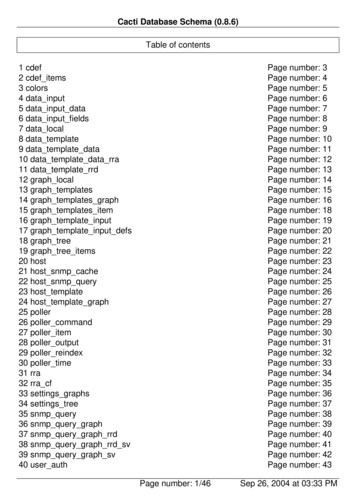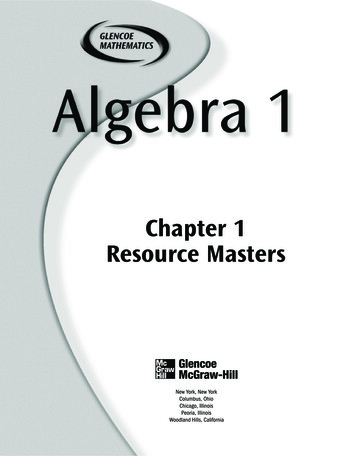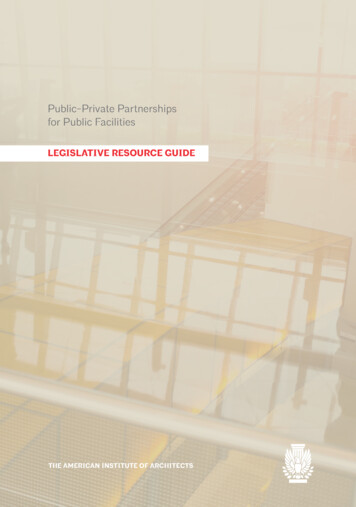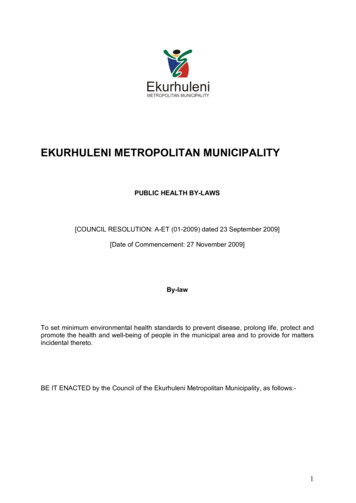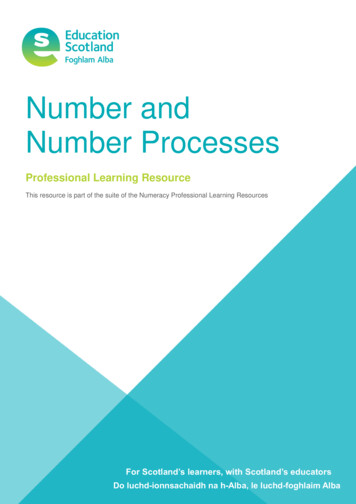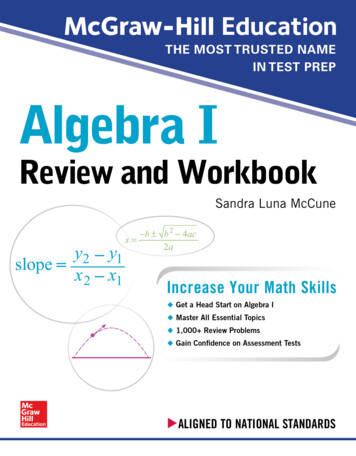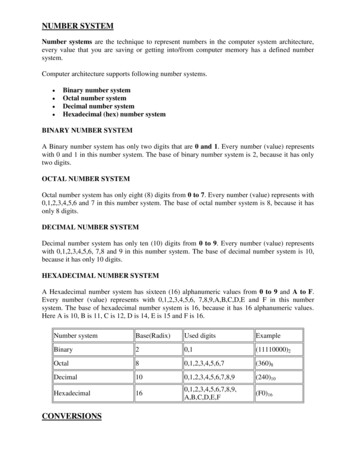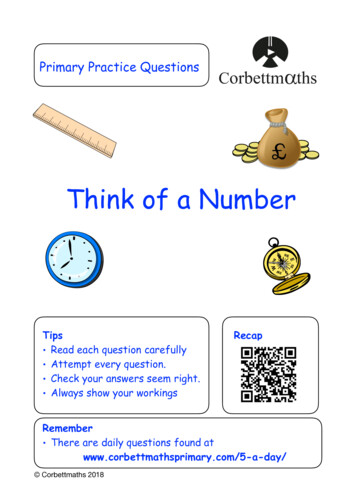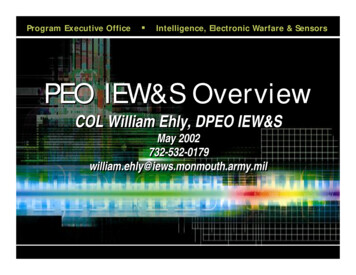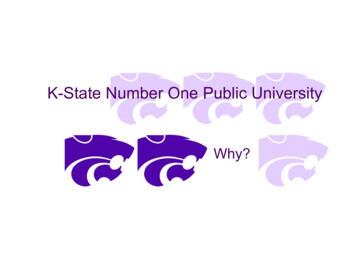
Transcription
K-State Number One Public UniversityWhy?
Why K-State?Why would someone choose K-State over Ivy LeagueSchools? K-State’s Math Program: High quality faculty and studentsLarge number winning research scholarshipsEncourages integrated researchEncourages Dual Degree PursuitsCaters to individual interestsGraduates enter High Tech IndustryGraduates enter Prestigious Graduate SchoolsBest performance on national and state-wide competitionsMeritorious performance in International CompetitionsHigh retention and graduation ratesOur programs
Why did you come to K-State?I came to K-State because ofthe faculty.So many of them come fromivy league schools.Our Math MajorsAnd what they saidThe Actuarial Math programis stronger than others.I was offered a positionwithout applying.I was interested inthe math behind thebiological models!Ph.D. StudentCombinatoricsRutgersMathematicsis vital forphysics.ActuarySaint Paul TravelersCSMATHMATH, STAT, ECONPeaceCorpsAlgebraic TopologyPh.D. StudentJohn HopkinsMATH, STAT,COMP MMPHYSMATHI got a scholarshipand found outI liked math.ME NEMATHMedical PhysicsPh.D. StudentUniv of FloridaMath was morestimulating. I liked themathematical rigor.MATHJeffrey Amoscame here.The mathematics.BioPhysicsPh.D. StudentBoston UniversityMath was moreinteresting.My High SchoolCalc Teacher.Stat Ph.D. StudentUniv at BerkleyMATHMATH/STATMathematicsPh.D. StudentUniv of TexasMATH
My Math Tour and Visit"The tours given by mathematics represented the department very well.““After meeting with you, I realized how many doors a math major opens."“It was interesting to know what options were available for individuals with a math degree as far ascareer choices go as well as the support offered to the students by the faculty, staff and fellowstudents in math.”“The math department gave the most personalized informative visit.”"Thank you for taking the time to visit with us - and what a visit it was!“"John and Dan enjoyed their math tour yesterday. We had much to talk about when they got home.”"As we walked away, I asked John, "What do you think?" He said "I could see myself going here.""It was really interesting and amazing to listen to your magic stories of math. I found something, Ihope I can visit your "magic room" again."“Meeting with you helped immensely, as you were hospitable, making us comfortable enough to askquestions."“I appreciate very much that you were able to accommodate us on such short notice."
What I thought about the math programMy math professors were very helpful in supporting me in deciding where to go andwhat to do.The math help sessions are good. I like those. They definitely helped.I really like the way basic math classes are set up. I really liked having multiple teachersexplaining the same stuff to me.The math professors were always very willing to help you understand a topic or workwith you outside of class.You’re able to approach professors, even if they don’t teach the class, and get help.You can get to know professors since the upper level classes are so small.The math web pages were helpful, easy to navigate and find what I was looking for : It has sample programs - studies laid out for four years and suggested courses. It was a helpful way to find different instructor email addresses and office hours. I really liked having the old tests on the websites.The opportunity to grade papers helped me secure my foundation in basic math.To really understand some physical concepts in my other major requires a huge amountof mathematical machinery.Upper level Professors in other departments encouraged my taking more math.Getting advice from math advisors was good. They had a little more insight into if youwanted to learn more about a subject, then you’re going to need to take these courses.I feel like I’ve been challenged just enough.I liked how I was able to tailor the math program just for me.
How we help students excel 2008 Ph.D. Student Univ of Michigan. 2008 BS Math, Physics, K-State. 2008 1st individually in theKCMC. 2007 Goldwater Nominee. 2007 The top scorer in the State on the Putnam. 2007 Mathematics Advanced Study at Penn-State. 2007 Penn State Univ Summer REU. 2006 and 2007 I-Center Research Award. 2006 K-State REU in Physics. 2006 McNair Scholar.Before I came here I didn’t know that undergraduates didresearch.I felt like there was a lot of support. Faculty notice your mathematical interest and talent They try to make sure to support your interests and goals And make sure that you know what is available. What kind ofoptions students have. 2007 Ph.D. Student Univ of Washington in Seattle. 2007 BS Math, Physics, K-State. 2007 Honorable Mention for the 17th Annual Alice T. Schafer Prize. 2007 Presidential Award for Distinguished Undergraduate Student in Research. 2007 DOD Internship. 2006 DOD Director's Summer Program. 2006 Goldwater Scholar. 2006 I-Center Research Award. 2006 member of team that placed 1st in the KCMC. 2006 Clare Boothe Luce scholar. 2005 Budapest Semesters in Mathematics Study Abroad. 2005 University of Nebraska REU.It’s a really good program for people who are passionate aboutmath. I liked that I could take graduate level research as an undergraduate. Itook both Masters and Ph.D. level research courses. My friends inschools that did not have a graduate program had more trouble gettinginto grad school then I did. Working in advanced help teaches you to think on your feet and solveproblems that much faster. I also think grading the upper level classes has really helped my ownstudies.
Why Math?Why dual or major in math? Math is in everything There is life after math Higher level Math helps students in all fields Top Level Positions go to Math MajorsThe Engineer and the Math Major Thinking of Graduate School, Math will help
Really Great AdvisingWhat makes our advising so good Everyone is treated the samePersonalized one-on-one advisingDetailed initial advising appointmentOpen ended appointments allow more than anhour if neededFaculty are available for questionsWe encourage duals and help students achieve“their” goals by offering advice applicable to bothdegrees.
Who majors in Math?People who love math Some like the detailed workings of math Some like to solve problems Some want it for a tool to help in another field Some have learned about the career optionsand have chosen one of these http://emath.ams.org/mathmoments
Careers in MathActuary Works with statistics and probabilities May dual in Statistics or Finance Works for big insurance or stock market companies Some interests in this area are:Risk ManagementInsurance Rate SetterStock Market AnalystRetirement Plan DesignerDerivative and Stock Option Analysis
Careers in MathMathematical Scientist or Research Analyst Works with a team of scientists using andinventing the cutting edge of mathematics Complements any scientific degree including:Physics, Biology, Biochem, Chemistry,Geology, Microbiology, Pre-med, ComputerScience, Computer Engineering Works for high tech industries, armed forcesand government researchnext
Careers in MathMathematical Consultant Works with large businesses to solve complexmathematical problems. A variety of degrees complement this area Large companies and high tech industries andconsulting firms
Careers in MathCryptographer Creates and deciphers encryption codesusing mathematics May dual in Modern Language, ComputerScience or Computer Engineering Will work for a security agency, financialinstitution or internet company.
Careers in MathOperations Research Analyst optimizes the operation of a system andprovides a quantitative basis for decisionmaking, especially the allocation of resources. May dual in Computer Science or Engineering High tech industry or armed forces orgovernment
Careers in MathNumerical Analyst uses numerical procedures and computers toanalyze data and model physical systems. May dual in Computer Science or Engineering High tech industry or armed forces orgovernment
Careers in MathEnvironmental Mathematician Works with a team tackling toughenvironmental problems Dual in any of the sciences Works for industry and the government
Careers in MathTopologist Studies the mathematics of surfaces May dual in Computer Science or Engineeringor Theater Oceanography and mapping companies,animation companies
Careers Enhanced By MathActuaryDatabase AdministratorPlanning AnalystAnalyst ProgrammerDesignerProcess AnalystAvionic Operations AnalystEconomic AnalystProgram AnalystBiomathematicianEngineering AnalystResearch ScientistBiostatisticianFinancial AnalystRisk AnalystCapital Planning AnalystFinancial ConsultantRocket ScientistComputer Graphics DesignerInformation ScientistSatellite Research ScientistComputer ProgrammerInformation Systems ManagerScientific ConsultantComputer Research ScientistInvestment AnalystSoftware EngineerComputer ScientistMarket AnalystSpecial Effects DesignerComputer Security AnalystMathematical Computer ScientistStatisticianComputer Software EngineerMathematical ConsultantSystems AnalystComputer Systems AnalystMathematical Physical ChemistSystems Design AnalystCryptanalystMathematical PhysicistSystems IntegratorCryptographerNumerical AnalystTechnical AnalystCryptologistOperation Research AnalystTechnical ConsultantData Analyst
Some of Your Questions and AnswersWhat ACT score should I have to consider math as a major? There is no ACT score that determines if someone can major in math. We have alumni with low ACT scoreswho have risen to the highest levels of their profession. What determines success is 10% talent and 90%effort. The effort always wins.What level of Math should I take? There are online Algebra and Calculus Math Placement Exams at http://www.math.ksu.edu/placement . that may help the student. Also Dr. Maginnis gives level of math advice on a walk in basis as well.How do I test out of math? The Academic Assistance Center in Holton Hall offers test outs of calculus and college algebra html. Many of the standardized tests like the CLEP andDANTES are offered at testing sites close to where the student lives. You can let them know this andtransfer them to the Academic Assistance Center at 532-6492 for more information.What if I am having trouble with a math course? Placement in the correct course is the first step. You may look at the course description, syllabi, courseoutline and a previous year’s exams to help make this decision. You may want to take the Algebra andCalculus Math Placement Exams to evaluate where you are at. Even though it takes longer and cost more, itis sometimes better to take a lower level math class to gain the knowledge needed to go on. Success shouldbe a strong factor in your decision. An A or B in the lower level course will help ensure a good grade in thenext level course. Math instructors are very accessible for questions. Students may sit in more than onelecture to hear the material again. There are a number of private and group tutoring services offered by theMath Department and others around campus: https://www.math.ksu.edu/courses/help/index.html. Finalexams from previous semesters are available at https://archive.math.ksu.edu/. Academic Assistance offershelp with math anxiety, 532-6492.Who teaches the math courses at K-State? All math lectures at K-State are taught by faculty in the Fall and Spring. At the 300 level and above facultyteach all parts of the courses offered except the labs in Matrix Theory which are taught by Ph.D. levelstudents.Is there help for this higher level math? The Math Department provides free help for selected courses 300 level and above in the Fall and Springsemesters.I got a letter about the engineering math science award, how do I apply? The Outstanding Senior in Mathematics and Science Award Please contact Carol Hewitt at (785) 532-5455 orclhewitt@ksu.edu.Is there an Actuarial Science Program at K-State? Yes. .How do I find out more about a math scholarship? Visit or call and ask to speak with Deb or John in at 2-0557 or 2-6750.
Please call or email us if you haveany questions.532-0557 ugmath@math.ksu.eduOr visitwww.math.ksu.edu/main
2007 Goldwater Nominee. 2007 Thetop scorer in the State on the Putnam. 2007 Mathematics Advanced Study at Penn-State. 2007 Penn State Univ Summer REU. 2006 and 2007 I-Center Research Award. 2006 K-State REU in Physics. 2006 McNair Scholar. 2007 Ph.D. Student Univ of Washington in Seattle. 2007 BS Math, Physics, K-State.
